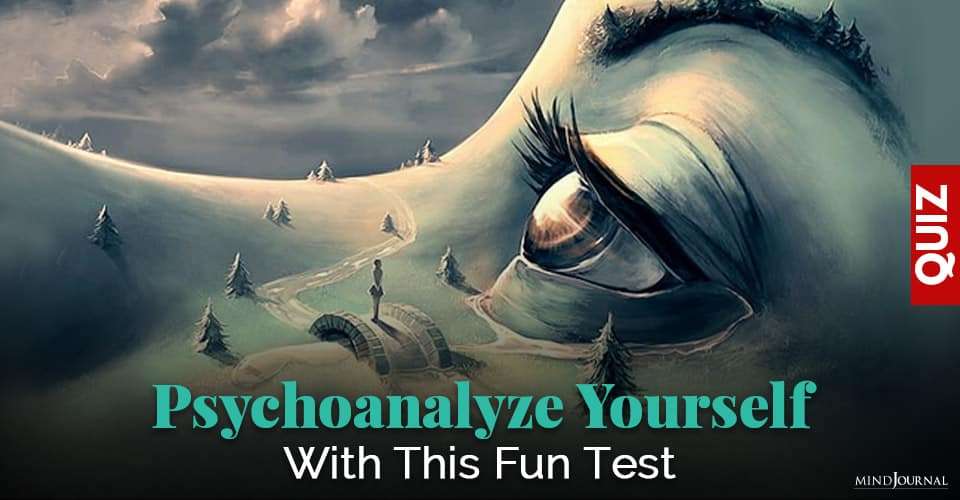
“Explanation separates us from astonishment, which is the only gateway to the incomprehensible.” ~Eugene Ionesco
We are taught from a very young age that it is our responsibility to reflect on the motives behind our actions and behaviors. From the time we can form sentences, we are asked the questions: “Why did you make that choice?” and “What made you do that?”
These questions often follow bad behavior and punishment. Our parents were trying to teach us, with the best of intentions, that we are responsible for our own actions.
This is a necessary lesson for young children, who are discovering their autonomy and the consequences of their behavior in a social world.
To a certain point, we should be held responsible for our actions, by others and ourselves. A conscientious person practices self-reflection and recognizes the origin and causes of thoughts and feelings when possible.
But for some of us, myself included, it feels like every thought and behavior needs to be analyzed.
Self-reflection, rumination, and justification fill my day and keep me up late at night. In order to maintain a sense of self-control and discipline, I dissect every emotion I feel and every action I take, all the while building a psychological narrative for my life.
For a long time, my drive to understand my behavior was an asset. I could explain my actions and thoughts more maturely than other kids, and adults prided me on my reflective nature.
When I was younger, I was blessed with mental health. Because my mind was functioning correctly and promoting the right behaviors and feelings, it was easy for me to explain and justify my actions. For the most part, they were appropriate and positive.
If I did act slightly out of line or overreact to a situation, I could assemble a psychological justification for it. Whether I dipped into parental relationships, miniature traumas from kindergarten, or a mere misunderstanding, I always managed to justify my behavior with sound psychological reasoning.
I thought of myself as my own personal therapist, totally capable of unearthing the intricate details of my inner psyche.
I perceived myself to be in total control of my feelings and my life. My brain was subject to my willpower. Most importantly, I was never at a loss when asked the question: “Why did you do that?”
The summer after I turned sixteen, my mental health began to unravel. I began to use my copious willpower and self-control to lose some weight and increase my fitness level.
At first, I did have control of my weight loss, and my brain’s intentions lined up with my conscious goals. I looked great, I felt great, and I hadn’t faltered a single day in my diet and exercise routine.
Then, some time in August, my weight-loss spiraled out of control. I became more restrictive and ramped up my exercise. My behavior, once a matter of conscious decision, was inexplicable to me. The thoughts in my head, centered on weight loss and extreme exercise, were loud and unintelligible to me.
For a while, I kept these thoughts quiet, telling myself that I would soon get control of my brain. I didn’t want to admit to myself or others that I had lost control of my thoughts and feelings.
I felt weak and stupid because I couldn’t understand my own behavior, and I felt the need to punish myself for failing to comprehend my mental state. Unfortunately, the easiest way for me to punish myself was to lose more weight and push myself even harder in my exercise.
My parents and other adults in my life did notice that I was losing weight, and asked me what was going on.
I cycled through faulty lines of logic—school stress, loneliness, a desire to be “healthy” taken too far—but I knew that none of these explanations was entirely correct. I would tell those around me that I had finally figured out the true root of my restrictive eating, only to continue the next day.
Nearly a year after this began, one of my favorite teachers suggested that we have a talk about my mental health. I told him about the craziness of the past year, and came clean with the fact that I didn’t understand my own mind anymore. I apologized profusely, waiting for him to question me about my social, emotional, and academic life to find answers.
Instead, he told me something I will never forget:
“Avery, you don’t have to understand. No one can really understand everything that they say or do. We aren’t supposed to figure everything out, because life is messy and not everything can be analyzed and justified. Some things are just incomprehensible.”
Some things are just incomprehensible. Hearing this lifted a huge weight from my shoulders. It was okay to rest in a state of unknowing, to breathe, even in the midst of confusion.
After this conversation, I was finally able to accept that my brain is only partially open to my conscious analysis. I can justify some of my actions, but sometimes I will feel or think certain things that can’t be rationally explained. I realized that I am allowed to understand only a fraction of what it means to be human.
In lieu of our talk, I stopped trying to justify my behavior, and instead focused on what I could control: my reaction to my thoughts and feelings. When thoughts enter my head, I can decide how to respond to them, even if I can’t understand where they came from or why they are surfacing in the moment.
Paradoxically, accepting that I do not and cannot justify all of my thoughts and behaviors has been the single most important step in recovering my weight and my mental health.
I no longer need to punish myself for failing to understand. I can love myself without absolutely knowing myself, just the way I love others without understanding their every thought and action.
At first, when talking to my family and friends, I expected them to be disappointed in me when I confessed that I couldn’t make sense of my feelings and behavior. Amazingly, the opposite happened: People felt closer to me than ever before, and found me more relatable because I too struggled to understand myself.
The truth is, none of us will ever fully grasp the origin and cause of our every thought, feeling, and action. Neurologically speaking, we actually aren’t supposed to; scientists now know that we can only infer and predict many of our actions, just as we predict the actions of others based on limited information.
Letting go of our constant self-analysis and rationalization is scary at first for people like me, who take pride in self-control and reflection.
However, by accepting that you cannot know or explain your whole self, you liberate yourself from the constant burden of rumination. You are free to control what you can control—your reactions to thoughts—and to let the rest come and go.
Next time you ask yourself, or someone asks you, “Why did you do that?” you have the right to say, “I don’t know” if the answer truly eludes you.
Of course, in some situations, it will be necessary to get to the root of a problem, especially when dealing with relationships. Even so, you have the right to not know yet; some feelings and habits can only be understood with time and distance.
It’s okay to tell others that you need time and space to process your thoughts, and that, for the time being, you cannot offer a succinct explanation.
They say that the only thing as complicated as the universe is the human brain. Both are chaotic, awe-inspiring, rife with contradictions, and impossible to fully comprehend. That is what makes them, and, by extension, life, so exciting and beautiful.
![]()
About Avery Rogers
Avery Rogers is a high school student in California. She aspires to be an author, spiritual writer, and neuroscientist when she grows up. She is the creator and host of the Brainstorms Podcast, a neuroscience podcast for teenagers. She also runs a personal blog about love, spirituality, and the meaning of life at on her blog Pluto’s Journal.
See a typo or inaccuracy? Please contact us so we can fix it!

Source: cc0 public domain
I’ve been practicing as a psychoanalyst for 10 years now, and as a clinical psychologist for 10 years more. For many professions, such tenure is considered seasoned but, in psychoanalytic circles, I’m just getting started. It’s true that it takes a long time to get the hang of practicing psychoanalysis. One learns the theories in training and has the experience of conducting a few analytic cases under supervision. One also has the important experience of being in a personal analysis which hopefully brings to life the theory and practice in a vital internal way. Once training is completed, though, the practice of psychoanalysis truly begins.
So, in a way, psychoanalytic practice is all about on-the-job training. There is something invaluable about having a lot of experience with patients. People are complex and the unconscious is tricky, so it takes a long time to get a sense of what is really going on. Getting to know many different types of patients helps a great deal, too, giving one a sense of commonalities and differences. I have been fortunate to have a good number of patients who really want, need, and can handle the long road to a more lasting type of change. Together, we are committed to the therapeutic work involved in helping them find a way out of the cul-de-sac of their ingrained patterns that keeps them from moving forward to the life that they could and want to have.

Source: cc0 Public Domain
These experiences have led me identify an essential bind that is an obstacle to progress for many of my patients. This bind is often not apparent at first but comes into view as it is played out, over and over again. It is a bind brought about by a rigidly held belief that there are only two polar opposite approaches to life. The first option is to achieve an ideal and the second is to give up. My patients get stuck because neither option works and they see no alternatives.
In trying to understand these experiences, I have come to view psychoanalysis, broadly speaking, as the discovery and pursuit of a third way—a way of operating psychologically that involves a balance between working toward improving one’s life while at the same time making peace with limitations.
In this essay, I want to elaborate a bit about the two ways that limit people, and then say more about the third way that opens a new path forward to lasting and productive change.
The first way—the path of pursuing an ideal—could also be called the pursuit of perfection. It involves the dogged pursuit of “the best” whether that means success, excitement, beauty, money, sex, power, or even being liked and respected by everyone. In this mode, there is no room for failure and no partial credit is given. Judgement for shortcomings is swift and harsh. It is all or nothing. Here, anxiety is the driving force and the wish for control reigns supreme.
The second way—the path of giving up—comes as a result of failing to live up to this perfectionistic standard. Once disillusioned by their pursuit of perfection, many of my patients shift to the opposite view that the problems of their lives are insurmountable. They see themselves as victims of other people’s power and demean their own capabilities. The hallmark feelings are resignation, hopelessness, and helplessness. They feel outmatched in life, up against too much from the outside without enough resources within. Here, depression takes the throne.
These two approaches to life go hand in hand, oscillating back and forth inside a person’s mind, sometimes from week to week or day to day, but even moment to moment. On one hand: drive, drive, drive in the pursuit of an ideal. When one falls short, one is then catapulted to the other side of the split: give up. Anything less than the ideal is viewed as being mediocre and not worth the effort. The misguided, distorted, even delusional assessment takes hold: I’ve tried so hard and I have nothing to show for it.
Having some distance and perspective, I can see that this kind of assessment isn’t based in reality. I can see my patients learning through experience, developing themselves through trial and error. I can see improvements in their lives, both on the inside and the outside. Sometimes they can see it, too, and there are moments of encouragement that fuel their determination to keep trying. But this important perspective doesn’t tend to last. On one hand, awareness of their progress can ignite the feeling that they can achieve it all, and the allure of the ideal takes hold again. On the other hand, awareness that their progress is limited and that there is more work to be done can bring about a weary, hopeless feeling that takes them back to depression. It is a vicious cycle with seemingly no way out.

Source: cc0 public domain
So this is where psychoanalysis offers something life-changing: it can help a person find and develop a third way. The third way involves forging a new path that can lead you out of the vicious circle. It can take you out of this either-or, all-or-nothing kind of thinking. It is a new mode that appreciates what is in-between. It acknowledges steps in the right direction and values incremental change, slowly over time.
The third way involves taking a balanced, more integrated view of life. It is based in the wisdom that, even though we can’t influence everything, we can influence some things. It involves making peace with limitations in oneself, others, and the world. The good is valued even though it is not perfect. Forgiveness, acceptance, and compassion live here. Some worry that this position of self-acceptance and acceptance of others runs the risk of being misused as an excuse to quit trying. No, embracing the third way means to keep at it, to keep working toward improvement while still recognizing that the pursuit of perfection is both futile and ultimately self-defeating.
Psychoanalysis is one of several therapeutic, educational, and spiritual practices that offer this third way. At its base, I think it is the most realistic way of approaching life because it endeavors to see the whole picture and to keep everything in mind. If my patients can begin to get the hang of it, I feel that I have helped them discover and develop a practice that will help them in our work together and for the rest of their lives.
Copyright 2017 Jennifer Kunst, PhD



